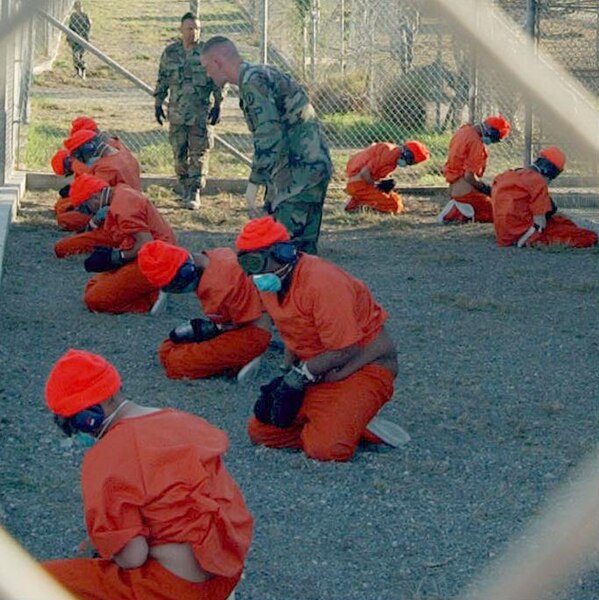Australia's willingness to allow its citizens to be illegally detained in the American concentration camp on its soil in Guantanamo Bay, Cuba, has been well noted. Why is it willing where other countries, specifically Britain, are not? There are manifold obvious reasons:
2. The Australian Howard regime is well to the right of the British government;
3. Australia is substantially more dependent on the US than the more powerful, though still not quite independent, UK;
4. Australia was itself a pioneer in the extra-judicial detention of foreigners in concentration camps, and the use of concentration camps in far-flung parts of its empire not technically part of its home jurisdiction. In fact, Australia's 'Pacific Solution' was the pioneering exercise in offshore mass imprisonment, taking place from September 2001, significantly before the US opened Gitmo. In both cases, the purpose was to manouevre around the constraints of both domestic law and the law of third countries, by creating a legal-territorial limbo.
Update: Today's suicides at Gitmo of course also recapitulate events in Australian detention. That it has taken so much longer for suicide to eventuate (assuming these were indeed suicides . . .) in this situation may, I think, be attributed to two factors: the religiosity of the inmates, who were imprisoned because they were fervently Muslim, and whose religion forbids suicide, and the much closer monitoring of inmates. That deaths are now occuring correlates with the loss of value of these inmates' lives to the state which is imprisoning them, which once viewed them as assets of a sort, where in Australia refugees lives were never accorded intrinsic value.
That said, I was going to say that the fresh revelations about Australians being detained by DIMA had some specific meaning, in that DIMA somehow has extraordinary powers in this. But really it's powers are not that surprising. While imprisonment in the Department of Immigration and Multicultural Affairs' concentration camps is determined by bureaucratic fiat, and this is something extraordinary, in that it can mark anyone without any kind of due process, the difference between this and a far wider problem, that of remand imprisonment, is relatively minor. Every year, tens of thousands of (not just 26) Australian citizens who haven't actually been proven guilty of anything, thousands of whom are, like the victims of Australia and America's concentration camps, never proven to have done anything wrong, are imprisoned in the brutal regular prison system in Australia on remand. While they are accorded a bail hearing prior to this, these hearings themselves are cursory, and generally have outcomes based on the feelings of the prosecution. The real lesson is that those without the means or wit to defend themselves, namely the poor and immigrants, which two categories have a large overlap, are in Australia frequently subjected to Kafkaesque treatment at the hands of the state, and by token of the lack of connections to the establishment which allows this to happen to them, we are unlikely to hear about it.
This is not to suggest that there is some easy reform of the migration or carceral institutions which will fix the problem of the massive punishment of the innocent—quite the contrary.
skip to main |
skip to sidebar
Blog Archive
-
▼
2006
(59)
-
▼
June
(11)
- Sydney Futures Twilight Symposia
- Australia: trampling on the dignity and sovereignt...
- Save the whales, stuff the native from Reading the...
- Windschuttle vs. Windschuttle
- A dark day: the first* person convicted of terrori...
- Freedom of Information in Australia
- New federal election laws
- Houses in motion
- Gitmo: an Australian invention
- Political Economy at the University of Sydney
- Some thoughts on the present conjuncture
-
▼
June
(11)


